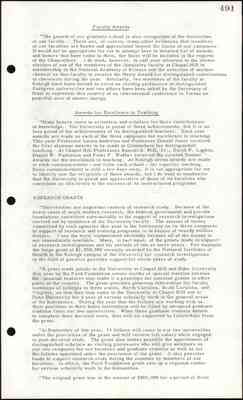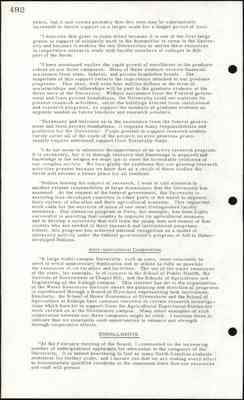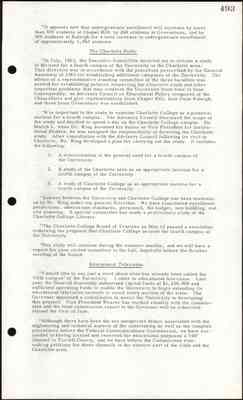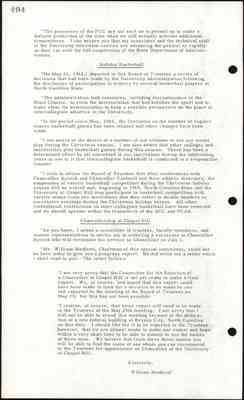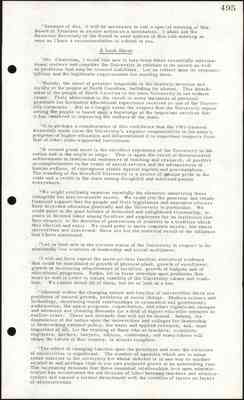Pages
491
Faculty Awards
"The growth of our graduate school is also recognition of the distinction of our faculty. There are, of course, many other evidences that members of our faculties are known and appreciated beyond the limits of our campuses. It would not be appropriate for me to attempt here to detailed list of awards and honors that have come to them, for these will be included in the reports of the Chancellors. I do wish, however, to call your attention to the recent election of one of the members of the chemistry faculty at Chapel Hill to membership in the National Academy of Science and the selection of another chemist on that faculty to receive the Herty Award for distinguished contributions to chemistry during the year. Similarly, two members of the faculty at Raleigh have been invited to serve as visiting professors at distinguished European universities and two others have been asked by the Secretary of State to represent this country at an international conference in Vienna on peaceful uses of atomic energy.
Awards for Excellence in Teaching
"Many honors come to scientists and scholars for their contributions to knowledge. The University is proud of these achievements, but it is no less proud of the achievements of its distinguished teachers. Each year awards are made on each of the three campuses for excellence in teaching. This year Professor Laura Anderton and Professor Donald Jones received the first alumnae awards to be made at Greensboro for distinguished teaching. At Chapel Hill Professors Samuel S. Hill, Jr. , David P. Lapkin, Daniel W. Patterson and Peter F. Walker received the coveted Tanner Awards for the excellence in teaching. At Raleigh seven awards are made at each commencement - one from each school - for superior teaching. Since commencement is still a few days away, it is not appropriate for me to identify now the recipients of these awards, but I do want to emphasize that the University is proud and appreciative of those of its faculties who contribute so effectively to the success of its instructional programs.
RESEARCH GRANTS
"Universities are important centers of research study. Because of the heavy costs of much modern research, the federal government and private foundations contribute substantially to the support of research investigations carried out by members of the University faculty. The amount of money committed by such agencies this year to the University on its three campuses in support of research and training programs is in excess of twenty million dollars. I use the word 'committeed advisedly because all of the money is not immediately available. Many, in fact most, of the grants made in support of research investigations are for periods of two or more years. For example, the large grant of $1,858,000 recently awarded by the National Institutes of Health to the Raleigh campus of the University for research investigations in the field of genetics provides support for seven years of study.
"A grant made jointly to the University at Chapel Hill and Duke University this year by the Ford Foundation seems worthy of special mention because its unusual features may make it a prototype for similiar grants in other parts of the country. The grant provides generous fellowships for faculty members of colleges in three states, North Carolina, South Carolina, and Virginia, so that they may come to the University at Chapel Hill and to Duke University for a year of serious scholarly work in the general areas of the humanities. During the year that the fellows are working with us, their positions in their home institutions will be filled by advanced graduate students from our two universities. When these graduate students return to complete their doctoral work, they will be supported by fellowships from the grant.
"In September of this year, 13 fellows will come to our two universities under the provisions of the grant and will receive full salary while engaged in post-doctoral study. The grant also makes possible the appointment of distinguished scholars as visiting professors who will give seminars on our two campuses for our faculties and graduate students as well as for the fellows appointed under the provisions of the grant. It also provides funds to support research study during the summer by members of our faculties. In effect, the Ford Foundation grant sets up a regional center for serious scholarly work in the humanities.
"The original grant was in the amount of $800,000 for a period of three
492
years, but it now seems probably that this sum may be substantially increased to insure support on a larger scale for a longer period of time.
"I describe this grant in some detail because it is one of the first large grants in support of scholarly work in the humanities to come to the University and because it enables the two Universities to utilize their resources in cooperative research study with faculty members of colleges in this part of the South.
"I have mentioned earlier the rapid growth of enrollment in the graduate school on our three campuses. Many of these students receive financial assistance from state, federal, and private foundation founds. The magnitude of this support reflects the importance attached to our graduate programs. This year, well over four million dollars in the form of assistantships and fellowships will be paid to the graduate students at the three units of the University. Without assistance from the Federal government and from private foundations, the University could not maintain its present research activities, secur the buildings erected from institutional and research programs, or support the numbers of graduate students so urgently needed as future teachers and research scholars.
"Necessary and welcome as is the assistance from the federal government and from private foundations, it imposes many responsibilities and problems for the University. Funds granted to support research studies rarely cover all of the costs of the project; so even generous grants usually require additional support from University funds.
"I do not mean to minimize the importance of an active research program. It is necessary, for it is through research that knowledge is acquired and knowledge is the weapon we must use to meet the formidable problems of our complex society. We face gladly the problems that our growing research activities present because we know that as a result of these studies the world will become a better place for all mankind.
"Before leaving the subject of research, I want to call attention to another related responsibility of large dimensions that the University has assumed. At the request of the federal government, the University is assisting less-developed countries in other parts of the world to improve their system of education and their agricultural economy. This important work calls for the services of some of our most distinguished faculty members. Our extensive program in Peru, for example, has been highly successful in assisting that country to improve its agricultural economy and to develop a university that will train the young men and women of that country who are needed in their research and instructional programs. Indeed, this program has achieved national recognition as a model of university activity under the federal government's program of Aid to Underdeveloped Nations.
Inter-Institutional Cooperation
"A large multi-campus University, such as ours, must constantly be alert to avoid unnecessary duplication and to utilize as fully as possible the resources of its faculties and facilities. The use of the water resources of the state, for example, is of concern to the School of Public Health, the Institute of Government at Chapel Hill, and the Schools of Agriculture and Engineering on the Raleigh campus. This interest has let to the organization of the Water Resources Institute where the planning and direction of programs is coordinated through a Board of Directors representing both institutions. Similarly, the School of Home Economics at Greensboro and the School of Agriculture at Raleigh have common interests in certain research investigations which have let to support from the Agricultural Experiment Station for work carried on at the Greensboro campus. Many other examples of such cooperation between our three campuses might be cited. I mention these to indicate that we constantly seek opportunities to enhance our strength through cooperative efforts.
ENROLLMENTS
"At the February meeting of the Board, I commented on the increasing number of undergraduate applicants for admission to the campuses of the University. It is indeed heartening to find so many North Carolina students ambitious for further study, and I assure you that we are making every effort to accommodate qualified residents to the maximum limit that our resources and staff will permit.
493
"It appears now that undergraduate enrollment will increase by more than 300 students at Chapel Hill; by 260 students at Greensboro, and by 500 students at Raleigh for a total increase in undergraduate enrollment of approximately 1,060 students.
The Charlotte Study
"In July, 1963, the Executive Committee directed me to initiate a study of the need for a fourth campus of the University in the Charlotte area. This directive was in accordance with the procedure prescribed by the General Assembly of 1963 for establishing additional campuses of the University. The advice of a representative standing committee of the three faculties was needed for establishing policies respecting the Charlotte study and other important problems that may confront the University from time to time. Consequently, an Advisory Council on Educational Policy composed of the Chancellors and give representatives from Chapel Hill, four from Raleigh, and three from Greensboro was established.
"It is important in the study to examine Charlotte College as a potential nucleus for a fourth campus. The Advisory Council discussed the scope of the study and decided to spend a day on the Charlotte College campus. On March 1, when Dr. King assumed his duties as Vice President for Institutional Studies, he was assigned the responsibility of directing the Charlotte study. After consultation with the Advisory Council following its visit to Charlotte, Dr. King developed a plan for carrying out the study. It includes the following:
1. A determination of the general need for a fourth campus of the University.
2. A study of the Charlotte area as an appropriate location for a fourth campus of the University.
3. A study of Charlotte College as an appropriate nucleus for a fourth campus of the University.
"Liaison between the University and Charlotte College has been maintained by Dr. King under my general direction. We have considered enrollment projections, admissions standards, personnel, the budget, new building, and site planning. A special committee has made a preliminary study of the Charlotte College Library.
"The Charlotte College Board of Trustees on May 12 passed a resolution endorsing the proposal that Charlotte College become the fourth campus of the University.
"Our study will continue during the summer months, and we will have a report for your review sometime in the fall, hopefully before the October meeting of the Board.
Educational Television
"I would like to say just a word about what has already been called the 'fifth campus' of the University. I refer to educational television. Last year the General Assembly authorized capital funds of $1,250,000 and sufficient operating funds to enable the University to begin extending its educational television network to reach every section of the state. The Governor appointed a commission to assist the University in developing this project. Vice President Weaver has worked steadily with the commission and the final commission report to the Governor will be submitted around the first of June.
"Although there have been the not unexpected delays associated with the engineering and technical aspects of the undertaking as well as the complex procedures before the Federal Communications Commission, we have succeeded in having located and reserved for educational purposes a VHF channel in Tyrrell County, and we have before the Commission rulemaking petitions for three channels in the western part of the state and the Charlotte area.
494
"The processes of the FCC are not such as to permit us to make a definite prediction of the time when we will actually activate additional transmitters. I can assure you that my associates and the technical staff of the University television service are advancing the project as rapidly as they can with the full cooperation of the State Department of Administration.
Holiday Basketball
"On May 22, 1961, I reported to this Board of Trustees a series of decisions that had been made by the University administration following the disclosure of participation in bribery by several basketball players at North Carolina State.
"The administration took measures, including discontinuance of the Dixie Classic, to stem the deterioration that had befallen the sport and to make clear its determination to keep a sensible perspective on the place of intercollegiate athletics in the University.
"In the period since May, 1961, the limitation on the number of regular season basketball games has been relaxed and other changes have been made.
"I am aware of the desire of a number of our citizens to see our teams play during the Christmas season. I am also aware that other colleges and universities play basketball games during this season. There has been a determined effort by all concerned in our institutions during the intervening years to see to it that intercollegiate basketball is conducted in a responsible manner.
"I wish to advise the Board of Trustees that after conferences with Chancellor Aycock and Chancellor Caldwell and their athletic directors, the suspension of varsity basketball competition during the Christmas holiday season will be waived and, beginning in 1965, North Carolina State and the University at Chapel Hill may participate in basketball competition with varsity teams from two institutions that they select in double-headers on successive evenings during the Christmas holiday season. All other institutional restrictions on inter-collegiate basketball have been removed and we should operate within the framework of the ACC and NCAA.
Chancellorship at Chapel Hill
"As you know, I asked a committee of trustees, faculty members, and alumni representatives to advise me in selecting a successor to Chancellor Aycock who will terminate his service as Chancellor on July 1.
"Mr. William Medford, Chairman of this special committee, could not be here today to give you a progress report. He did write me a letter which I shall read to you. The letter follows:
'I am very sorry that the Committee for the Selection of a Chancellor at Chapel Hill is not yet ready to make a final report. We, of course, had hoped that this report could have been made in time for a decision to be made by you and reported to the meeting of the Board of Trustees on May 25; but this has not been possible.
'I realize, of course, that some report will need to be made to the Trustees at the May 2 5th meeting. I am sorry that I will not be able to attend this meeting because of the dedication of a new federal building at Bryson City, North Carolina on this date. I should like for it to be reported to the Trustees however, that we are almost ready to make our report and hope within a very short time to be able to submit to you the names of three men. We believe that from these three names you will be able to find the name of one whom you can recommend to the Trustees for appointment as Chancellor of the University at Chapel Hill.
Sincerely,
William Medford'.
495
"Because of this, it will be necessary to call a special meeting of this Board of Trustees to secure action on a nomination. I shall ask the Assistant Secretary of the Board to send notices of this call meeting as soon as I have a recommendation to submit to you.
A Look Ahead
"Mr. Chairman, I would like now to turn from these essentially informational matters and consider the University in relation to its assets as well as problems that may be counted liabilities. Let us reflect upon its responsibilities and the legitimate requirements for meeting them.
"Surely, the asset of greatest magnitude is the historic devotion and loyalty of the people of North Carolina, including its alumni. This attachment of the people of North Carolina to the state University is not without cause. Their admiration is the result in many instances of personal gratitude for formative educational experience received on one of the University campuses. But in a larger sense the respect that the University enjoys among the people is based upon a knowledge of the important services that it has rendered in improving the welfare of the state.
"It is perhaps a manifestation of this confidence that the 1963 General Assembly made clear the University's singular responsibility in the state's program of higher education and differentiated it in important respects from that of other state-supported institutions.
A second great asset is the excellent reputation of the University in the nation and in the world at large. This is again the result of demonstrated achievement in intellectual endeavors of teaching and research, of positive accomplishments in the realm of social service and the advancement of human welfare, of courageous stands against bigotry and provincialism. The standing of the threefold University is a source of genuine pride to the state and a credit to the state among thoughtful and informed people everywhere.
"We might profitably examine morefully the elements underlying these intangible but also invaluable assets. We could cite the generous and steady financial support that the people and their legislators and executive officers have accorded education generally and the University in particular. We could point to the good fortune of dedicated and enlightened trusteeship, to years of devoted labor among faculties and employees for an institution that they respect, to the devotion of generations of students to a tradition which they cherish and enjoy. We could point to more concrete assets, but where universities are concerned, these are but the material result of the influence that I have mentioned.
"Let us look now to the current status of the University in respect to its admittedly fine tradition of leadership and social usefulness.
"I will not here repeat the more-or-less familiar statistical evidence that could be marshaled of growth of physical plant, growth of enrollment, growth of increasing effectiveness of faculties, growth of budgets and of educational programs. Rathe, let us focus attention upon problems that must be met in order to insure viability of the University values and tradition. We cannot detail all of them, but let us look at a few.
"Inherent within the changing nature and function of universities there are problems of natural growth, problems of social change. Modern science and technology, increasing world relationships in commerce and government, authomation, the space program, organization, and other significant changes and advances are creating demands for a kind of higher education unknown in earlier years. These are demands that will not be denied. Indeed, the dependence of the nation upon the universities and colleges for leadership in determining national policy, for basic and applied research, and, most important of all, for the training of those who as teachers, scientists, engineers, doctors, lawyers, editors, statesmen, and many others will shape the future of this country, is almost complete.
"The effect of changing function upon the practices and even the structure of universities is significant. The number of agencies which are in some sense exterior to the university but whose interest is in one way or another related to and perhaps vital to our own purposes grows at an astonishing rate. The increasing demands that these essential relationships levy upon administration has accentuated the old division of labor between teachers and administrators and caused a further detachment with the creation of layers on layers of administration.
